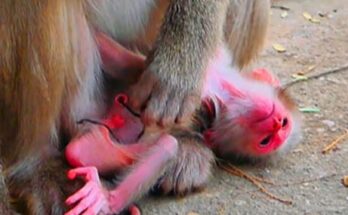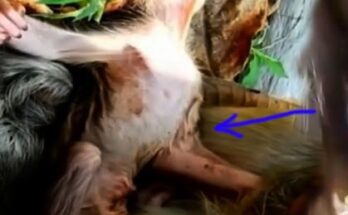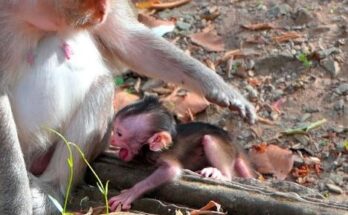The act of a mother monkey trying to stop her baby from nursing might seem confusing at first, especially since nursing is vital for a young animal’s growth and survival. However, this behavior can stem from a variety of reasons, many of which are rooted in the complexities of animal behavior, survival instincts, and the need for social balance. By examining the behavior of primates in general, we can uncover a few potential explanations for why a mother might restrict nursing in certain situations.
1. Weaning Process
One of the primary reasons a mother monkey might stop her baby from nursing is because the baby is reaching an age where it is time to begin the weaning process. In many species of monkeys, mothers instinctively begin to limit nursing as their offspring mature. Weaning, which typically occurs gradually, helps the baby transition from a milk-based diet to solid food. The mother might discourage nursing as a way to promote the baby’s independence and encourage it to explore other food sources, like fruits, leaves, or insects. This behavior is a natural step in ensuring the young monkey’s development and survival, as it learns the necessary skills for foraging and eating independently.
Weaning also serves a biological purpose: it allows the mother to conserve energy. As the baby grows older, its nutritional needs become greater, and nursing can become a significant drain on the mother’s resources. By gradually reducing nursing, the mother ensures that she can better meet her own needs, especially if she is pregnant with a new baby or needs to invest energy into protecting or caring for older offspring.
2. Maternal Discouragement of Overdependence
In some cases, a mother may attempt to stop her baby from nursing because it has become overly dependent on her milk for comfort. This can be a strategy to promote emotional and behavioral independence. In many primate species, mothers begin to limit nursing once they feel their offspring is emotionally mature enough to tolerate a reduction in dependency. Excessive nursing beyond the developmental phase can also hinder the socialization of the young monkey. By curbing the behavior, the mother teaches her baby how to cope with other forms of social interaction and stress management.
Mothers may use physical cues, such as pulling away or moving out of reach, to establish boundaries. This behavior can be seen as a form of socialization, where the mother helps her offspring learn to navigate the world without relying on her milk or presence for comfort.
3. Environmental or Social Stressors
In some cases, external factors may contribute to the mother’s attempt to stop nursing. If there is a significant environmental or social stressor, such as a predator nearby or competition for resources, a mother may restrict nursing to encourage her baby to focus on survival. A nursing baby is more vulnerable because it requires the mother to stay still and often in one place, making both mother and infant more conspicuous to predators. In such a situation, the mother may physically prevent the baby from nursing to ensure both of their safety.
Furthermore, social dynamics within the troop or group of monkeys might influence nursing behavior. If there are conflicts, competition, or the presence of a dominant male, the mother might restrict nursing as a way of ensuring the baby’s survival in a potentially hostile social environment.
4. Health Issues or Lack of Milk
In some instances, a mother monkey may attempt to stop nursing due to health issues or a lack of milk production. Stress, malnutrition, or illness can interfere with a mother’s ability to produce milk, and in such cases, the mother may instinctively reduce nursing or redirect the baby to other food sources. It is important to note that mothers are highly attuned to their own physical condition and the needs of their offspring. If a mother senses that she cannot adequately nourish her baby through breastfeeding, she may encourage the infant to explore other nutritional options.
Conclusion
The behavior of a mother monkey trying to stop her baby from nursing is complex and multifaceted. It reflects a combination of biological instincts, the weaning process, social and environmental pressures, and the health of the mother. This behavior is an important part of the mother’s role in ensuring the long-term survival and independence of her offspring. By limiting nursing at the right time, the mother provides the baby with the tools necessary to thrive both independently and within the social structure of its group.


